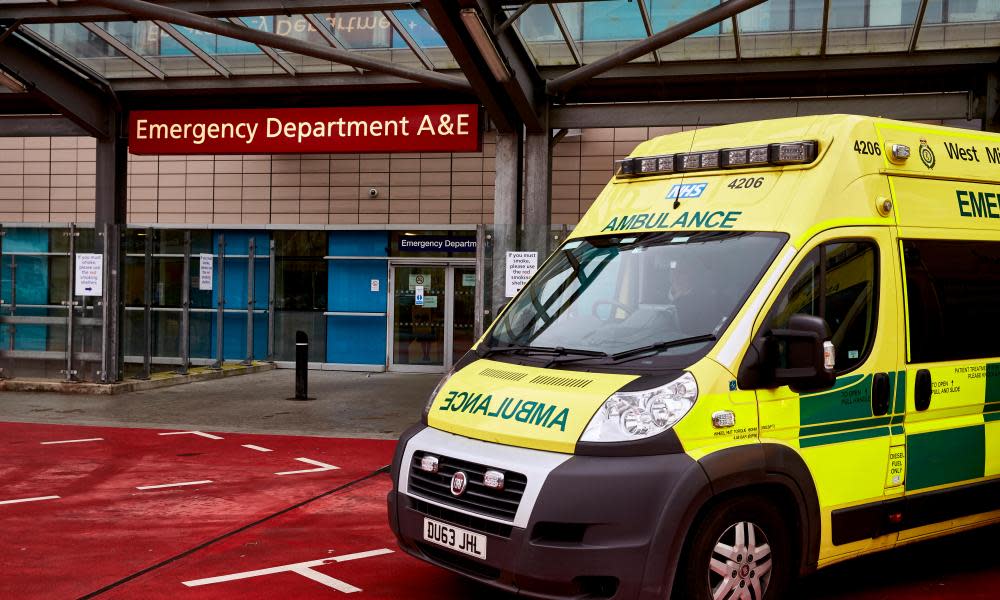England campaign targets seriously ill patients avoiding hospitals

A government campaign has been launched to encourage people who are seriously ill with non-coronavirus conditions such as heart attacks to seek help amid concerns some are avoiding hospitals.
The campaign, which will be rolled out next week, aims to encourage people to use vital services – such as cancer screening and care, maternity appointments and mental health support – as they usually would.
The NHS chief executive, Sir Simon Stevens, said delays in getting treatment posed a long-term risk to people’s health.
He stressed that the NHS was still there for patients without coronavirus who needed urgent and emergency services for stroke, heart attack, and other often fatal conditions.
While NHS staff have worked hard to put in place measures allowing people to access care safely – such as splitting services into coronavirus and non-coronavirus – attendances at A&E departments are on course to be 1m lower this April than last.
In the West Midlands, Toby Lewis, the chief executive of the Sandwell and West Midlands NHS Trust, said since the beginning of the month about 300 people with acute and severe conditions had refused to be taken to hospital.
“These are people with severe and acute conditions where an ambulance has been sent but they have refused to go to the hospital and a clinician has walked away very concerned about that person,” Lewis said.
“In general attendances at A&E departments and at GPs is very low among those people and they are generally declining care because of fear of being in a hospital setting. People are also not wanting to bother the NHS because they believe that medical professionals are busy on other things – both of these things are understandable but this is the wrong way to go and we want people to know the NHS is open for business. You are not alone.”
The campaign will include digital adverts, posters and social media featuring NHS staff to persuade people to contact their GP or the 111 service if they have urgent care needs – or 999 in emergencies – and to attend hospital if they are told they should.
Below is a look at how some other areas of the health service have been affected by coronavirus.
Cancer
The number of urgent referrals by GPs of people with suspected cancer has dropped by 75% during the pandemic, according to Cancer Research UK.
Screening services have been formally paused in Scotland, Wales and Northern Ireland and are de facto paused in England as invitations are not being sent out from screening hubs.
One NHS chief executive was concerned to see GP referrals for two-week target turnaround cancer diagnostics drop from 500 a week to 105, NHS Providers reported.
Heart attacks and strokes
The latest Public Health England data, for 13-19 April, shows that the number of people attending emergency departments in England with symptoms of a possible heart attack was down by around 40% on numbers seen at the beginning of March.
NHS England is putting figures together on the drop in stroke patients. Tony Rudd, clinical lead at the National Stroke Audit, said: “Nearly everywhere has seen a fairly dramatic drop-off in patients admitted for acute stroke, although it may be picking up again a bit over last week or so.”
Ambulance waiting times
Response time for the most common ambulance callouts rose 45% in March nationally and almost trebled in London, NHS England data shows. The national average response time for a category two call – those classified as an emergency but not immediately life-threatening – rose to 32 minutes 6 seconds against an 18-minute target.
Non-urgent operations
Tens of thousands of non-urgent surgeries have been cancelled to free up space for coronavirus patients, with wards turned into intensive care units.
Several acute trust chief executives have told the Health Service Journal that they are keen to resume more planned operations, as ministers and scientists say the peak of new Covid-19 cases may have passed. Some trust leaders said they believed routine elective surgery could be restarted as early as next week.
Mental health
Children’s mental health services across England have recorded a sharp fall in referrals. “There is no overall figure [on referrals], but we are having discussions about this. I can tell what is happening in my area but I asked every executive of the college what is happening around the country. We met last week,” said Bernadka Dubicka, chair of the Child and Adolescent Faculty at the Royal College of Psychiatrists.
In adult services Billy Boland, chair of the Faculty of General Adult Psychiatry at the Royal College of Psychiatrists, said anecdotal feedback suggested GPs were not referring as many people to mental health services. He said: “A lot of mental health services have changed how they work so there are more remote consultations.”

